Comprehensive Analysis: Effect on Aboriginal Islander Well-being
VerifiedAdded on 2023/01/13
|9
|2566
|96
Essay
AI Summary
This essay provides a comprehensive overview of the factors impacting the well-being of Aboriginal and Torres Strait Islander peoples in Australia. It examines the influence of education, highlighting how limited access can negatively affect health outcomes. The essay delves into the detrimental effects of racial discrimination and racism, emphasizing their role in widening health disparities. It also explores the impact of employment and income, underscoring the link between economic factors and access to healthcare. Furthermore, the essay addresses health behaviors and lifestyles, including poor nutrition, substance abuse, and lack of physical activity, as significant contributors to poor health outcomes. The conclusion emphasizes the complex interplay of environmental, cultural, and economic factors that shape the well-being of these indigenous communities.
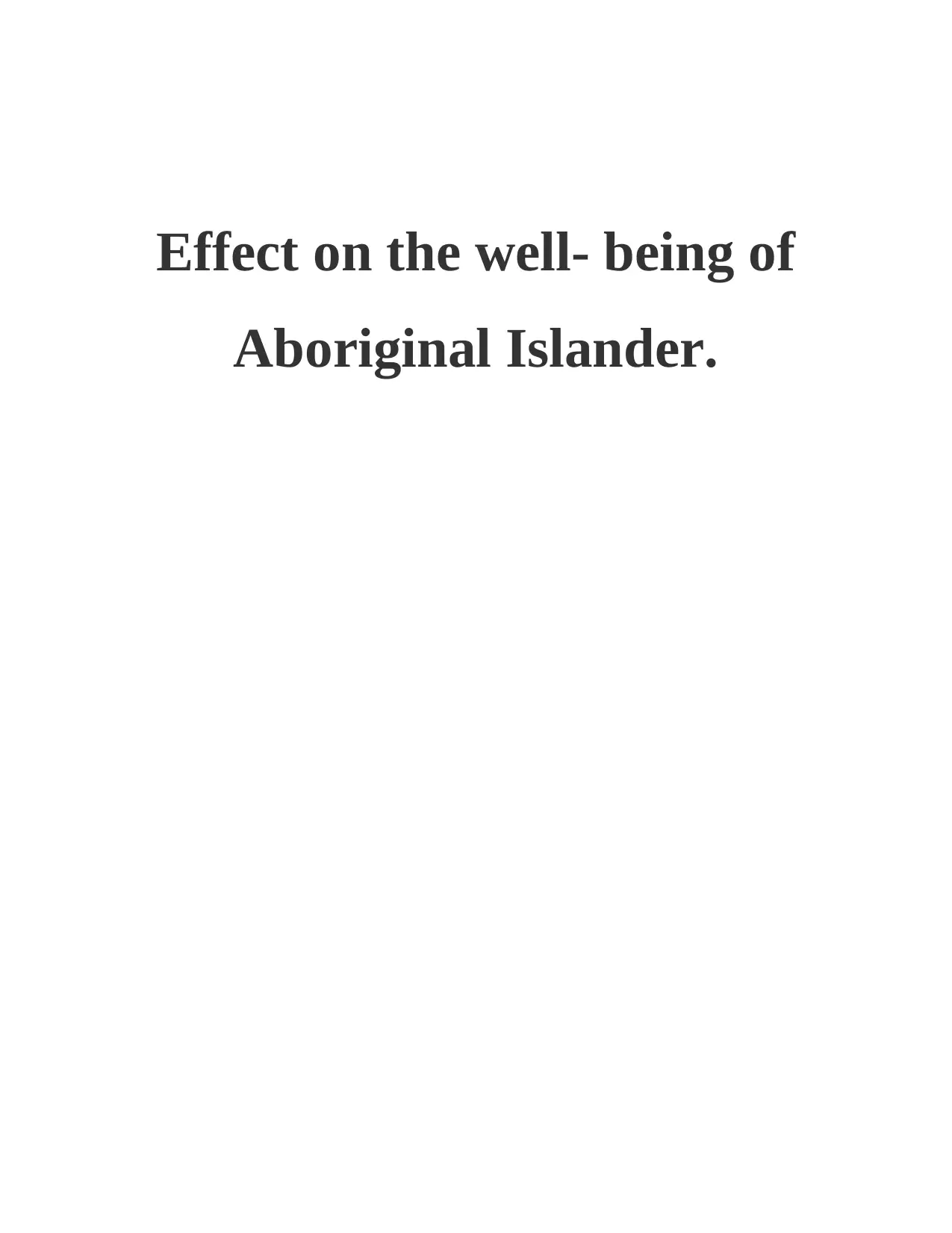
Effect on the well- being of
Aboriginal Islander.
Aboriginal Islander.
Paraphrase This Document
Need a fresh take? Get an instant paraphrase of this document with our AI Paraphraser
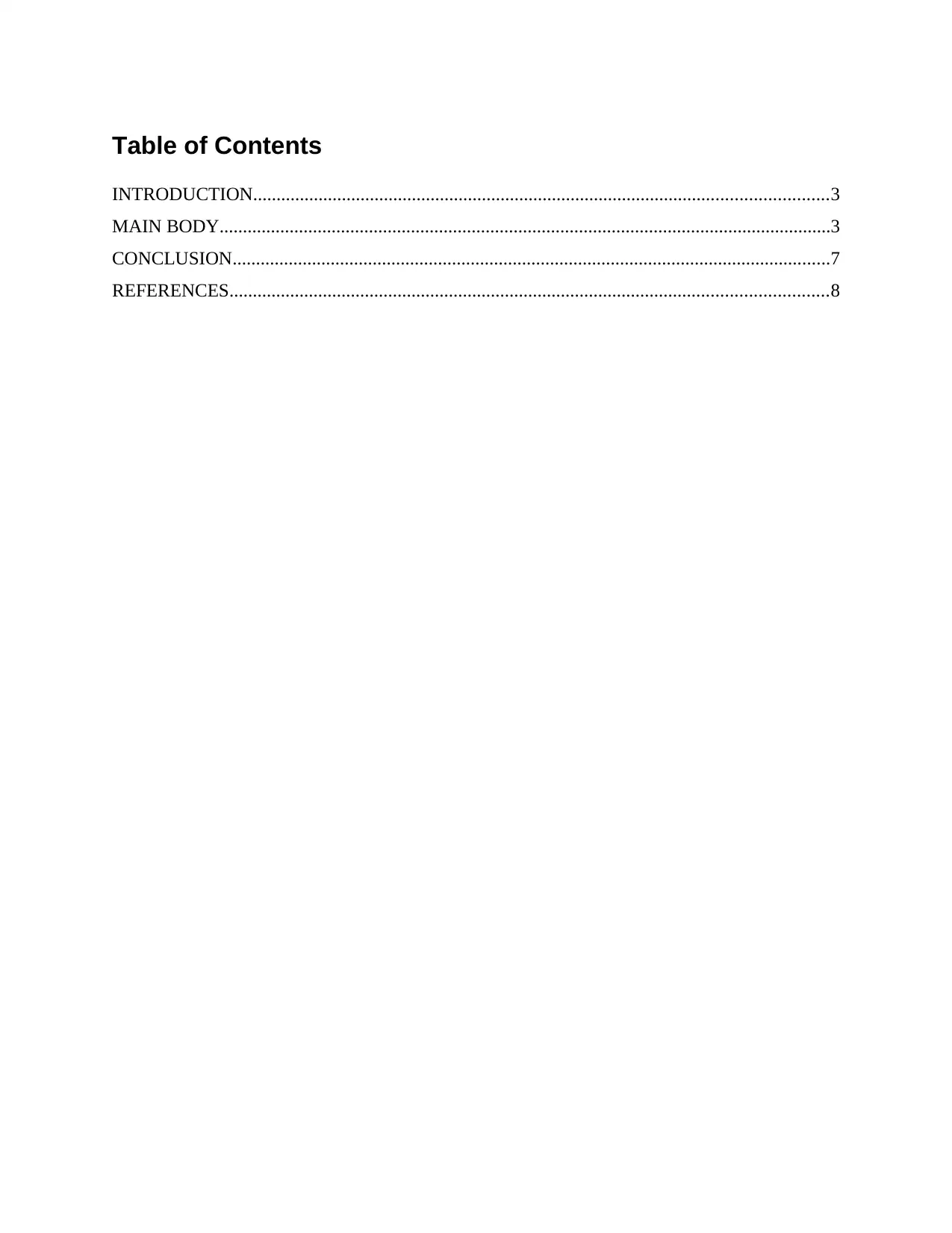
Table of Contents
INTRODUCTION...........................................................................................................................3
MAIN BODY...................................................................................................................................3
CONCLUSION................................................................................................................................7
REFERENCES................................................................................................................................8
INTRODUCTION...........................................................................................................................3
MAIN BODY...................................................................................................................................3
CONCLUSION................................................................................................................................7
REFERENCES................................................................................................................................8
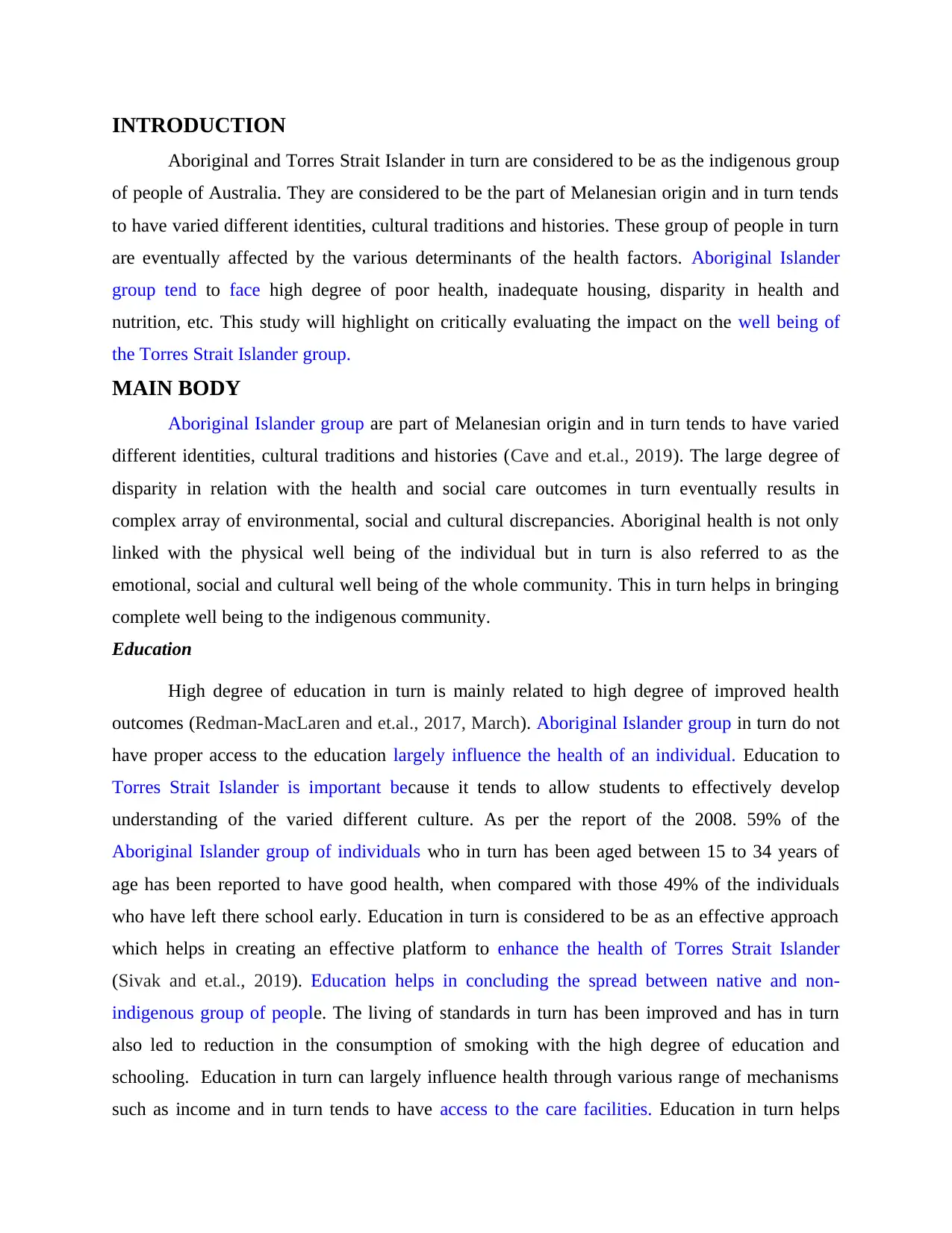
INTRODUCTION
Aboriginal and Torres Strait Islander in turn are considered to be as the indigenous group
of people of Australia. They are considered to be the part of Melanesian origin and in turn tends
to have varied different identities, cultural traditions and histories. These group of people in turn
are eventually affected by the various determinants of the health factors. Aboriginal Islander
group tend to face high degree of poor health, inadequate housing, disparity in health and
nutrition, etc. This study will highlight on critically evaluating the impact on the well being of
the Torres Strait Islander group.
MAIN BODY
Aboriginal Islander group are part of Melanesian origin and in turn tends to have varied
different identities, cultural traditions and histories (Cave and et.al., 2019). The large degree of
disparity in relation with the health and social care outcomes in turn eventually results in
complex array of environmental, social and cultural discrepancies. Aboriginal health is not only
linked with the physical well being of the individual but in turn is also referred to as the
emotional, social and cultural well being of the whole community. This in turn helps in bringing
complete well being to the indigenous community.
Education
High degree of education in turn is mainly related to high degree of improved health
outcomes (Redman-MacLaren and et.al., 2017, March). Aboriginal Islander group in turn do not
have proper access to the education largely influence the health of an individual. Education to
Torres Strait Islander is important because it tends to allow students to effectively develop
understanding of the varied different culture. As per the report of the 2008. 59% of the
Aboriginal Islander group of individuals who in turn has been aged between 15 to 34 years of
age has been reported to have good health, when compared with those 49% of the individuals
who have left there school early. Education in turn is considered to be as an effective approach
which helps in creating an effective platform to enhance the health of Torres Strait Islander
(Sivak and et.al., 2019). Education helps in concluding the spread between native and non-
indigenous group of people. The living of standards in turn has been improved and has in turn
also led to reduction in the consumption of smoking with the high degree of education and
schooling. Education in turn can largely influence health through various range of mechanisms
such as income and in turn tends to have access to the care facilities. Education in turn helps
Aboriginal and Torres Strait Islander in turn are considered to be as the indigenous group
of people of Australia. They are considered to be the part of Melanesian origin and in turn tends
to have varied different identities, cultural traditions and histories. These group of people in turn
are eventually affected by the various determinants of the health factors. Aboriginal Islander
group tend to face high degree of poor health, inadequate housing, disparity in health and
nutrition, etc. This study will highlight on critically evaluating the impact on the well being of
the Torres Strait Islander group.
MAIN BODY
Aboriginal Islander group are part of Melanesian origin and in turn tends to have varied
different identities, cultural traditions and histories (Cave and et.al., 2019). The large degree of
disparity in relation with the health and social care outcomes in turn eventually results in
complex array of environmental, social and cultural discrepancies. Aboriginal health is not only
linked with the physical well being of the individual but in turn is also referred to as the
emotional, social and cultural well being of the whole community. This in turn helps in bringing
complete well being to the indigenous community.
Education
High degree of education in turn is mainly related to high degree of improved health
outcomes (Redman-MacLaren and et.al., 2017, March). Aboriginal Islander group in turn do not
have proper access to the education largely influence the health of an individual. Education to
Torres Strait Islander is important because it tends to allow students to effectively develop
understanding of the varied different culture. As per the report of the 2008. 59% of the
Aboriginal Islander group of individuals who in turn has been aged between 15 to 34 years of
age has been reported to have good health, when compared with those 49% of the individuals
who have left there school early. Education in turn is considered to be as an effective approach
which helps in creating an effective platform to enhance the health of Torres Strait Islander
(Sivak and et.al., 2019). Education helps in concluding the spread between native and non-
indigenous group of people. The living of standards in turn has been improved and has in turn
also led to reduction in the consumption of smoking with the high degree of education and
schooling. Education in turn can largely influence health through various range of mechanisms
such as income and in turn tends to have access to the care facilities. Education in turn helps
⊘ This is a preview!⊘
Do you want full access?
Subscribe today to unlock all pages.

Trusted by 1+ million students worldwide
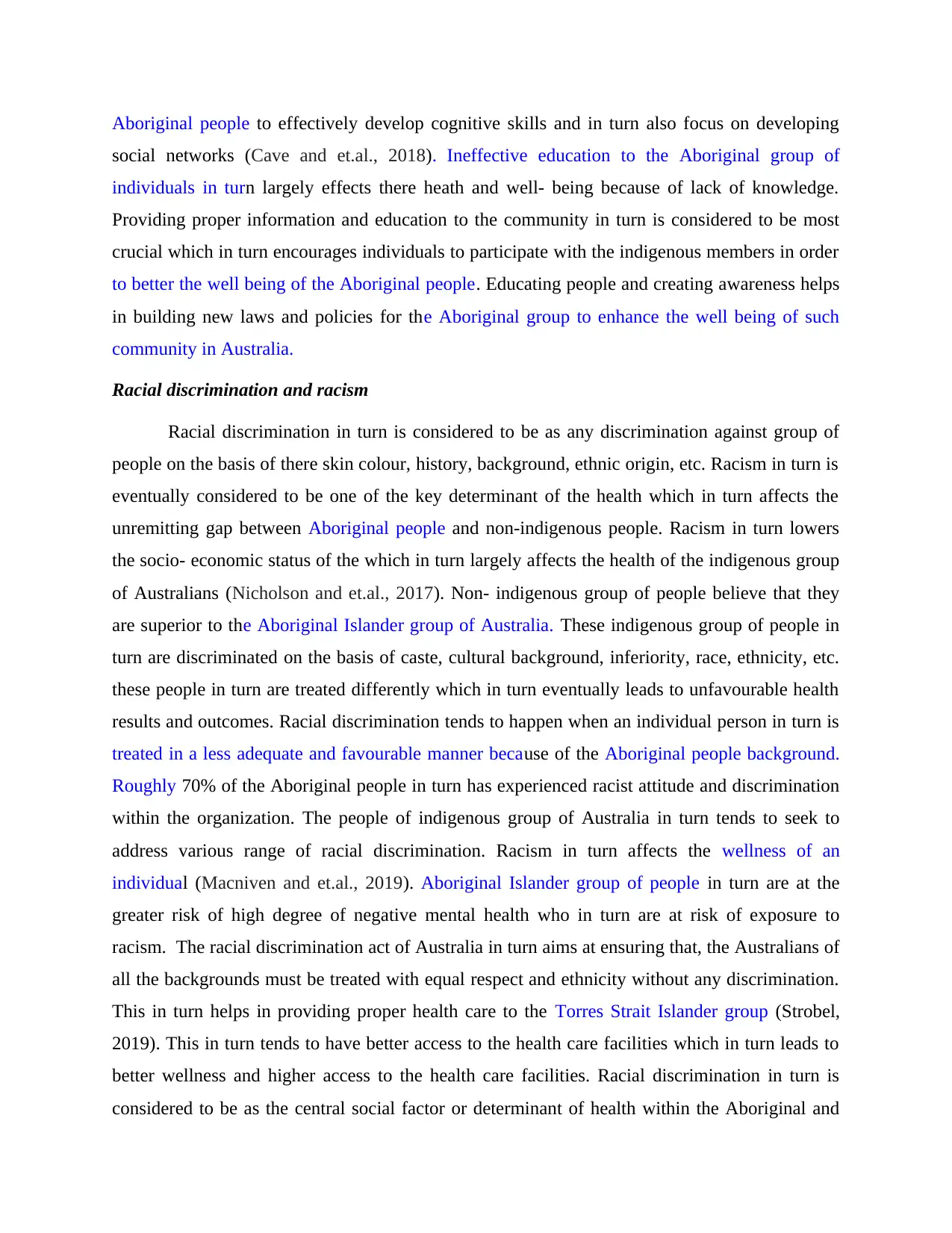
Aboriginal people to effectively develop cognitive skills and in turn also focus on developing
social networks (Cave and et.al., 2018). Ineffective education to the Aboriginal group of
individuals in turn largely effects there heath and well- being because of lack of knowledge.
Providing proper information and education to the community in turn is considered to be most
crucial which in turn encourages individuals to participate with the indigenous members in order
to better the well being of the Aboriginal people. Educating people and creating awareness helps
in building new laws and policies for the Aboriginal group to enhance the well being of such
community in Australia.
Racial discrimination and racism
Racial discrimination in turn is considered to be as any discrimination against group of
people on the basis of there skin colour, history, background, ethnic origin, etc. Racism in turn is
eventually considered to be one of the key determinant of the health which in turn affects the
unremitting gap between Aboriginal people and non-indigenous people. Racism in turn lowers
the socio- economic status of the which in turn largely affects the health of the indigenous group
of Australians (Nicholson and et.al., 2017). Non- indigenous group of people believe that they
are superior to the Aboriginal Islander group of Australia. These indigenous group of people in
turn are discriminated on the basis of caste, cultural background, inferiority, race, ethnicity, etc.
these people in turn are treated differently which in turn eventually leads to unfavourable health
results and outcomes. Racial discrimination tends to happen when an individual person in turn is
treated in a less adequate and favourable manner because of the Aboriginal people background.
Roughly 70% of the Aboriginal people in turn has experienced racist attitude and discrimination
within the organization. The people of indigenous group of Australia in turn tends to seek to
address various range of racial discrimination. Racism in turn affects the wellness of an
individual (Macniven and et.al., 2019). Aboriginal Islander group of people in turn are at the
greater risk of high degree of negative mental health who in turn are at risk of exposure to
racism. The racial discrimination act of Australia in turn aims at ensuring that, the Australians of
all the backgrounds must be treated with equal respect and ethnicity without any discrimination.
This in turn helps in providing proper health care to the Torres Strait Islander group (Strobel,
2019). This in turn tends to have better access to the health care facilities which in turn leads to
better wellness and higher access to the health care facilities. Racial discrimination in turn is
considered to be as the central social factor or determinant of health within the Aboriginal and
social networks (Cave and et.al., 2018). Ineffective education to the Aboriginal group of
individuals in turn largely effects there heath and well- being because of lack of knowledge.
Providing proper information and education to the community in turn is considered to be most
crucial which in turn encourages individuals to participate with the indigenous members in order
to better the well being of the Aboriginal people. Educating people and creating awareness helps
in building new laws and policies for the Aboriginal group to enhance the well being of such
community in Australia.
Racial discrimination and racism
Racial discrimination in turn is considered to be as any discrimination against group of
people on the basis of there skin colour, history, background, ethnic origin, etc. Racism in turn is
eventually considered to be one of the key determinant of the health which in turn affects the
unremitting gap between Aboriginal people and non-indigenous people. Racism in turn lowers
the socio- economic status of the which in turn largely affects the health of the indigenous group
of Australians (Nicholson and et.al., 2017). Non- indigenous group of people believe that they
are superior to the Aboriginal Islander group of Australia. These indigenous group of people in
turn are discriminated on the basis of caste, cultural background, inferiority, race, ethnicity, etc.
these people in turn are treated differently which in turn eventually leads to unfavourable health
results and outcomes. Racial discrimination tends to happen when an individual person in turn is
treated in a less adequate and favourable manner because of the Aboriginal people background.
Roughly 70% of the Aboriginal people in turn has experienced racist attitude and discrimination
within the organization. The people of indigenous group of Australia in turn tends to seek to
address various range of racial discrimination. Racism in turn affects the wellness of an
individual (Macniven and et.al., 2019). Aboriginal Islander group of people in turn are at the
greater risk of high degree of negative mental health who in turn are at risk of exposure to
racism. The racial discrimination act of Australia in turn aims at ensuring that, the Australians of
all the backgrounds must be treated with equal respect and ethnicity without any discrimination.
This in turn helps in providing proper health care to the Torres Strait Islander group (Strobel,
2019). This in turn tends to have better access to the health care facilities which in turn leads to
better wellness and higher access to the health care facilities. Racial discrimination in turn is
considered to be as the central social factor or determinant of health within the Aboriginal and
Paraphrase This Document
Need a fresh take? Get an instant paraphrase of this document with our AI Paraphraser
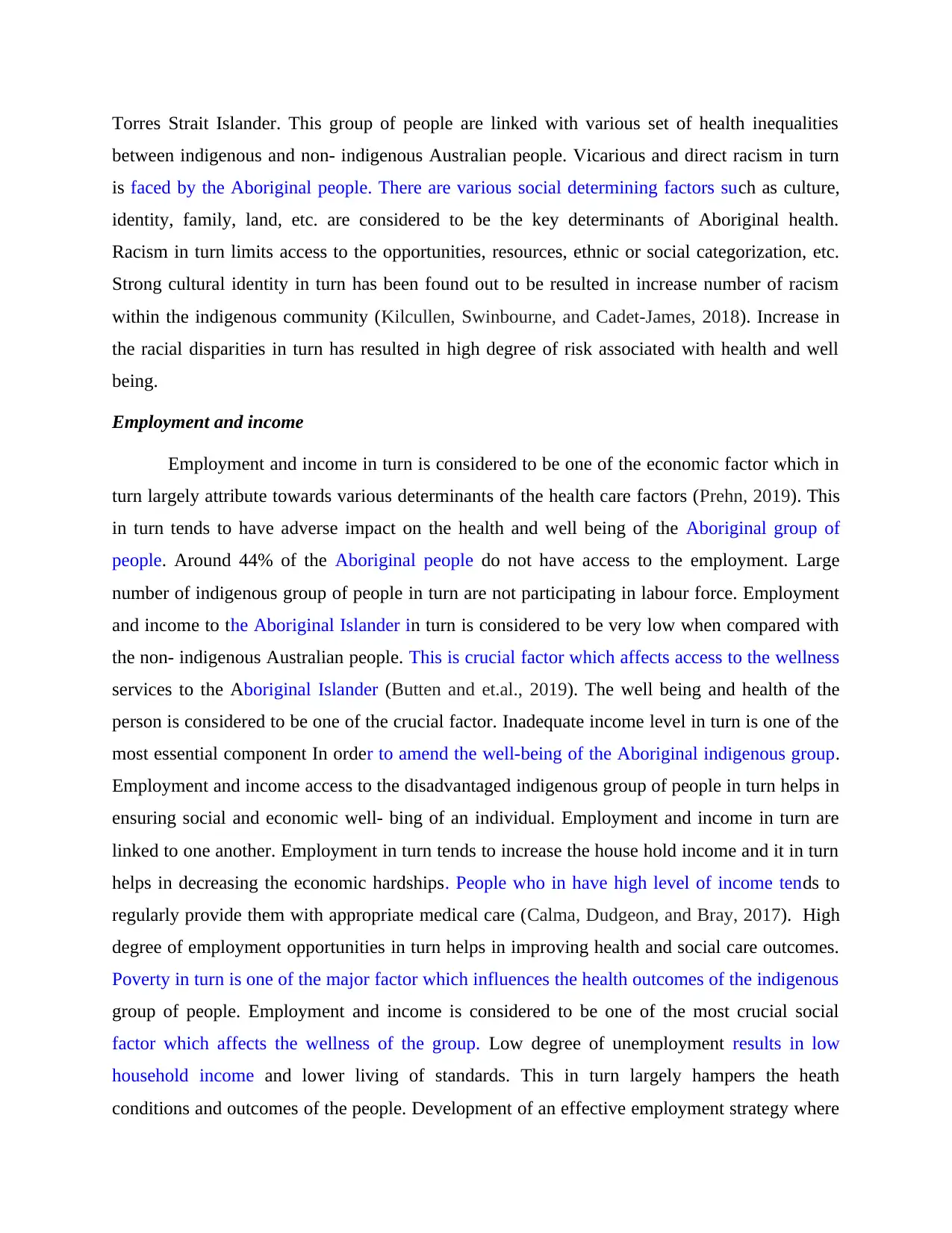
Torres Strait Islander. This group of people are linked with various set of health inequalities
between indigenous and non- indigenous Australian people. Vicarious and direct racism in turn
is faced by the Aboriginal people. There are various social determining factors such as culture,
identity, family, land, etc. are considered to be the key determinants of Aboriginal health.
Racism in turn limits access to the opportunities, resources, ethnic or social categorization, etc.
Strong cultural identity in turn has been found out to be resulted in increase number of racism
within the indigenous community (Kilcullen, Swinbourne, and Cadet‐James, 2018). Increase in
the racial disparities in turn has resulted in high degree of risk associated with health and well
being.
Employment and income
Employment and income in turn is considered to be one of the economic factor which in
turn largely attribute towards various determinants of the health care factors (Prehn, 2019). This
in turn tends to have adverse impact on the health and well being of the Aboriginal group of
people. Around 44% of the Aboriginal people do not have access to the employment. Large
number of indigenous group of people in turn are not participating in labour force. Employment
and income to the Aboriginal Islander in turn is considered to be very low when compared with
the non- indigenous Australian people. This is crucial factor which affects access to the wellness
services to the Aboriginal Islander (Butten and et.al., 2019). The well being and health of the
person is considered to be one of the crucial factor. Inadequate income level in turn is one of the
most essential component In order to amend the well-being of the Aboriginal indigenous group.
Employment and income access to the disadvantaged indigenous group of people in turn helps in
ensuring social and economic well- bing of an individual. Employment and income in turn are
linked to one another. Employment in turn tends to increase the house hold income and it in turn
helps in decreasing the economic hardships. People who in have high level of income tends to
regularly provide them with appropriate medical care (Calma, Dudgeon, and Bray, 2017). High
degree of employment opportunities in turn helps in improving health and social care outcomes.
Poverty in turn is one of the major factor which influences the health outcomes of the indigenous
group of people. Employment and income is considered to be one of the most crucial social
factor which affects the wellness of the group. Low degree of unemployment results in low
household income and lower living of standards. This in turn largely hampers the heath
conditions and outcomes of the people. Development of an effective employment strategy where
between indigenous and non- indigenous Australian people. Vicarious and direct racism in turn
is faced by the Aboriginal people. There are various social determining factors such as culture,
identity, family, land, etc. are considered to be the key determinants of Aboriginal health.
Racism in turn limits access to the opportunities, resources, ethnic or social categorization, etc.
Strong cultural identity in turn has been found out to be resulted in increase number of racism
within the indigenous community (Kilcullen, Swinbourne, and Cadet‐James, 2018). Increase in
the racial disparities in turn has resulted in high degree of risk associated with health and well
being.
Employment and income
Employment and income in turn is considered to be one of the economic factor which in
turn largely attribute towards various determinants of the health care factors (Prehn, 2019). This
in turn tends to have adverse impact on the health and well being of the Aboriginal group of
people. Around 44% of the Aboriginal people do not have access to the employment. Large
number of indigenous group of people in turn are not participating in labour force. Employment
and income to the Aboriginal Islander in turn is considered to be very low when compared with
the non- indigenous Australian people. This is crucial factor which affects access to the wellness
services to the Aboriginal Islander (Butten and et.al., 2019). The well being and health of the
person is considered to be one of the crucial factor. Inadequate income level in turn is one of the
most essential component In order to amend the well-being of the Aboriginal indigenous group.
Employment and income access to the disadvantaged indigenous group of people in turn helps in
ensuring social and economic well- bing of an individual. Employment and income in turn are
linked to one another. Employment in turn tends to increase the house hold income and it in turn
helps in decreasing the economic hardships. People who in have high level of income tends to
regularly provide them with appropriate medical care (Calma, Dudgeon, and Bray, 2017). High
degree of employment opportunities in turn helps in improving health and social care outcomes.
Poverty in turn is one of the major factor which influences the health outcomes of the indigenous
group of people. Employment and income is considered to be one of the most crucial social
factor which affects the wellness of the group. Low degree of unemployment results in low
household income and lower living of standards. This in turn largely hampers the heath
conditions and outcomes of the people. Development of an effective employment strategy where
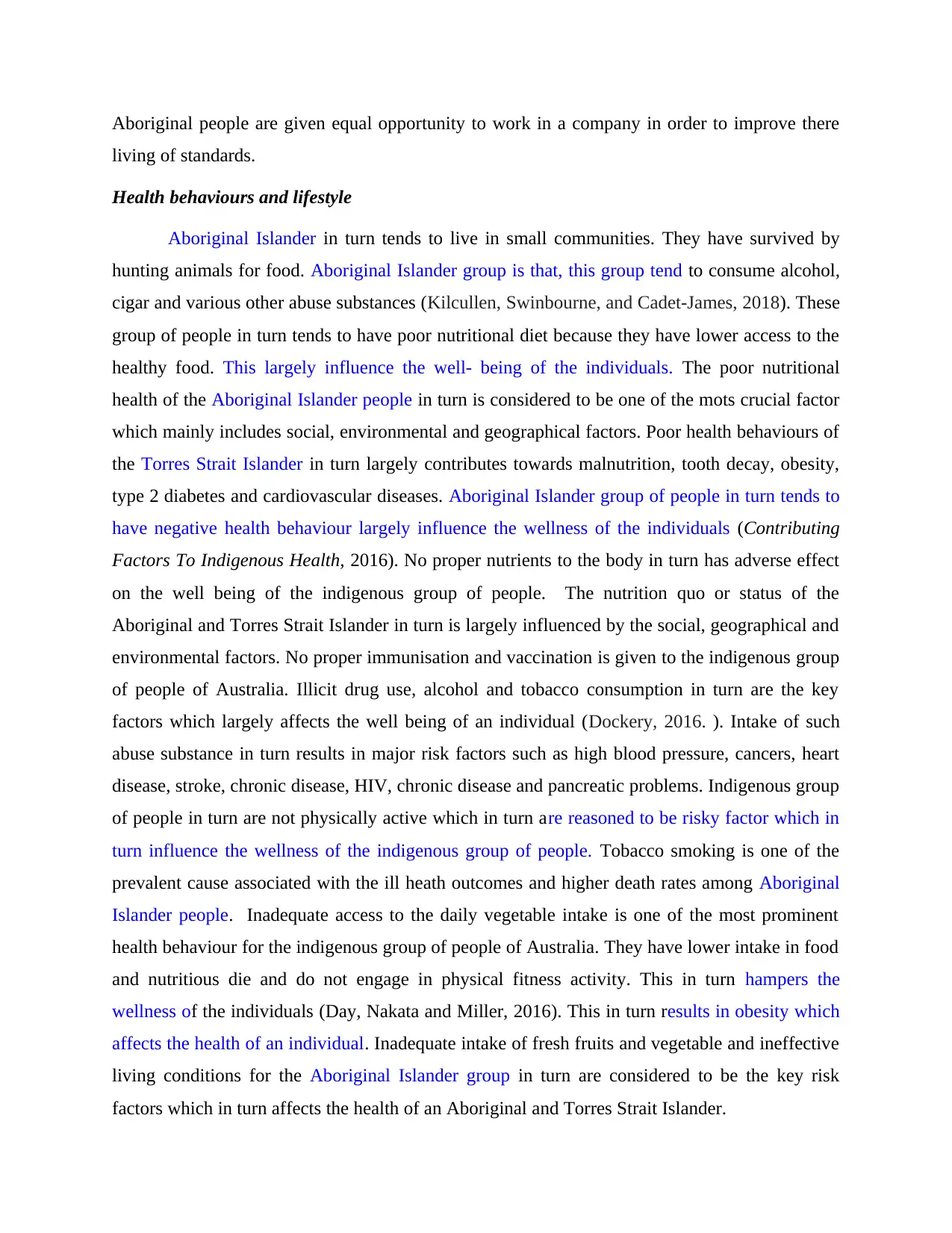
Aboriginal people are given equal opportunity to work in a company in order to improve there
living of standards.
Health behaviours and lifestyle
Aboriginal Islander in turn tends to live in small communities. They have survived by
hunting animals for food. Aboriginal Islander group is that, this group tend to consume alcohol,
cigar and various other abuse substances (Kilcullen, Swinbourne, and Cadet‐James, 2018). These
group of people in turn tends to have poor nutritional diet because they have lower access to the
healthy food. This largely influence the well- being of the individuals. The poor nutritional
health of the Aboriginal Islander people in turn is considered to be one of the mots crucial factor
which mainly includes social, environmental and geographical factors. Poor health behaviours of
the Torres Strait Islander in turn largely contributes towards malnutrition, tooth decay, obesity,
type 2 diabetes and cardiovascular diseases. Aboriginal Islander group of people in turn tends to
have negative health behaviour largely influence the wellness of the individuals (Contributing
Factors To Indigenous Health, 2016). No proper nutrients to the body in turn has adverse effect
on the well being of the indigenous group of people. The nutrition quo or status of the
Aboriginal and Torres Strait Islander in turn is largely influenced by the social, geographical and
environmental factors. No proper immunisation and vaccination is given to the indigenous group
of people of Australia. Illicit drug use, alcohol and tobacco consumption in turn are the key
factors which largely affects the well being of an individual (Dockery, 2016. ). Intake of such
abuse substance in turn results in major risk factors such as high blood pressure, cancers, heart
disease, stroke, chronic disease, HIV, chronic disease and pancreatic problems. Indigenous group
of people in turn are not physically active which in turn are reasoned to be risky factor which in
turn influence the wellness of the indigenous group of people. Tobacco smoking is one of the
prevalent cause associated with the ill heath outcomes and higher death rates among Aboriginal
Islander people. Inadequate access to the daily vegetable intake is one of the most prominent
health behaviour for the indigenous group of people of Australia. They have lower intake in food
and nutritious die and do not engage in physical fitness activity. This in turn hampers the
wellness of the individuals (Day, Nakata and Miller, 2016). This in turn results in obesity which
affects the health of an individual. Inadequate intake of fresh fruits and vegetable and ineffective
living conditions for the Aboriginal Islander group in turn are considered to be the key risk
factors which in turn affects the health of an Aboriginal and Torres Strait Islander.
living of standards.
Health behaviours and lifestyle
Aboriginal Islander in turn tends to live in small communities. They have survived by
hunting animals for food. Aboriginal Islander group is that, this group tend to consume alcohol,
cigar and various other abuse substances (Kilcullen, Swinbourne, and Cadet‐James, 2018). These
group of people in turn tends to have poor nutritional diet because they have lower access to the
healthy food. This largely influence the well- being of the individuals. The poor nutritional
health of the Aboriginal Islander people in turn is considered to be one of the mots crucial factor
which mainly includes social, environmental and geographical factors. Poor health behaviours of
the Torres Strait Islander in turn largely contributes towards malnutrition, tooth decay, obesity,
type 2 diabetes and cardiovascular diseases. Aboriginal Islander group of people in turn tends to
have negative health behaviour largely influence the wellness of the individuals (Contributing
Factors To Indigenous Health, 2016). No proper nutrients to the body in turn has adverse effect
on the well being of the indigenous group of people. The nutrition quo or status of the
Aboriginal and Torres Strait Islander in turn is largely influenced by the social, geographical and
environmental factors. No proper immunisation and vaccination is given to the indigenous group
of people of Australia. Illicit drug use, alcohol and tobacco consumption in turn are the key
factors which largely affects the well being of an individual (Dockery, 2016. ). Intake of such
abuse substance in turn results in major risk factors such as high blood pressure, cancers, heart
disease, stroke, chronic disease, HIV, chronic disease and pancreatic problems. Indigenous group
of people in turn are not physically active which in turn are reasoned to be risky factor which in
turn influence the wellness of the indigenous group of people. Tobacco smoking is one of the
prevalent cause associated with the ill heath outcomes and higher death rates among Aboriginal
Islander people. Inadequate access to the daily vegetable intake is one of the most prominent
health behaviour for the indigenous group of people of Australia. They have lower intake in food
and nutritious die and do not engage in physical fitness activity. This in turn hampers the
wellness of the individuals (Day, Nakata and Miller, 2016). This in turn results in obesity which
affects the health of an individual. Inadequate intake of fresh fruits and vegetable and ineffective
living conditions for the Aboriginal Islander group in turn are considered to be the key risk
factors which in turn affects the health of an Aboriginal and Torres Strait Islander.
⊘ This is a preview!⊘
Do you want full access?
Subscribe today to unlock all pages.

Trusted by 1+ million students worldwide
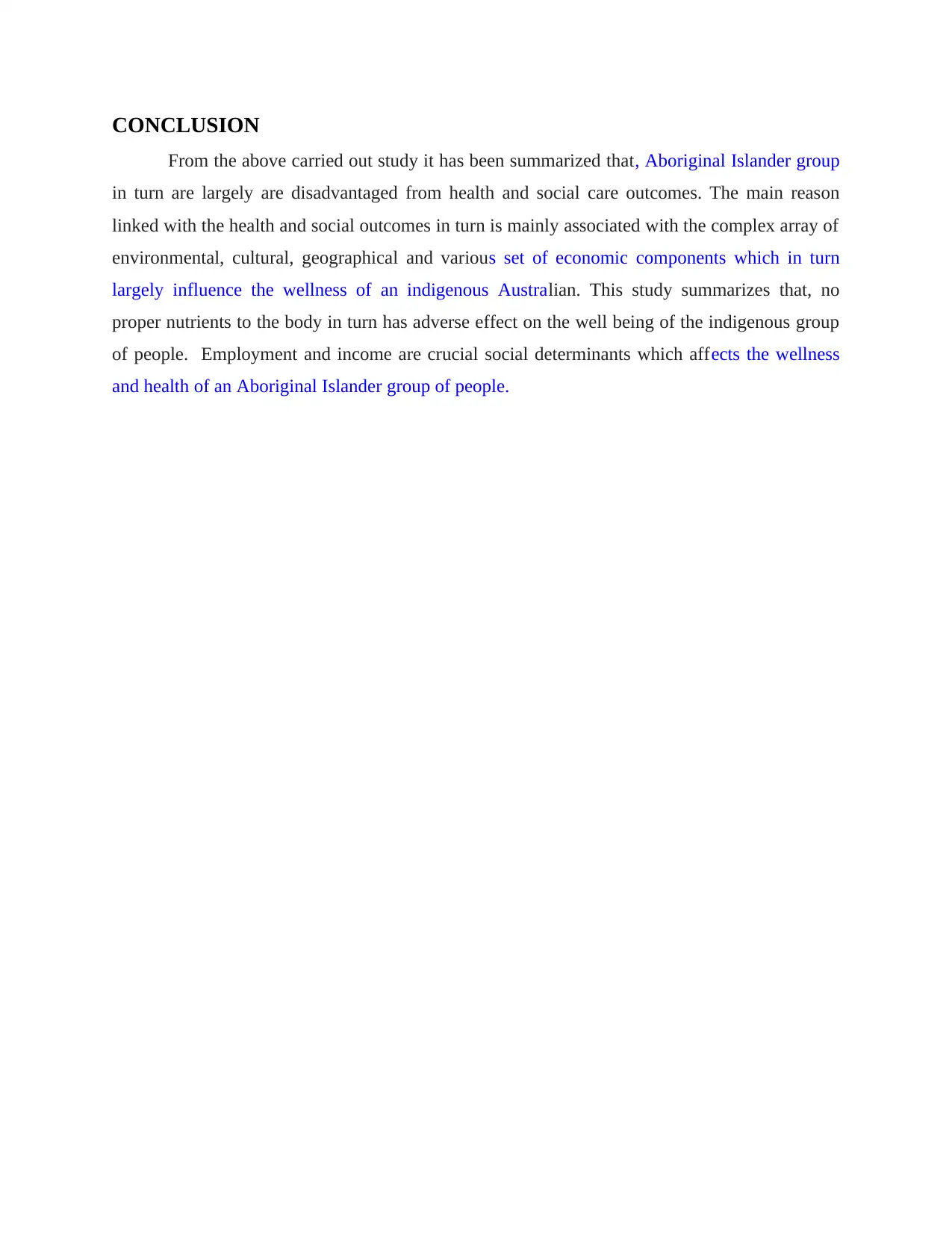
CONCLUSION
From the above carried out study it has been summarized that, Aboriginal Islander group
in turn are largely are disadvantaged from health and social care outcomes. The main reason
linked with the health and social outcomes in turn is mainly associated with the complex array of
environmental, cultural, geographical and various set of economic components which in turn
largely influence the wellness of an indigenous Australian. This study summarizes that, no
proper nutrients to the body in turn has adverse effect on the well being of the indigenous group
of people. Employment and income are crucial social determinants which affects the wellness
and health of an Aboriginal Islander group of people.
From the above carried out study it has been summarized that, Aboriginal Islander group
in turn are largely are disadvantaged from health and social care outcomes. The main reason
linked with the health and social outcomes in turn is mainly associated with the complex array of
environmental, cultural, geographical and various set of economic components which in turn
largely influence the wellness of an indigenous Australian. This study summarizes that, no
proper nutrients to the body in turn has adverse effect on the well being of the indigenous group
of people. Employment and income are crucial social determinants which affects the wellness
and health of an Aboriginal Islander group of people.
Paraphrase This Document
Need a fresh take? Get an instant paraphrase of this document with our AI Paraphraser
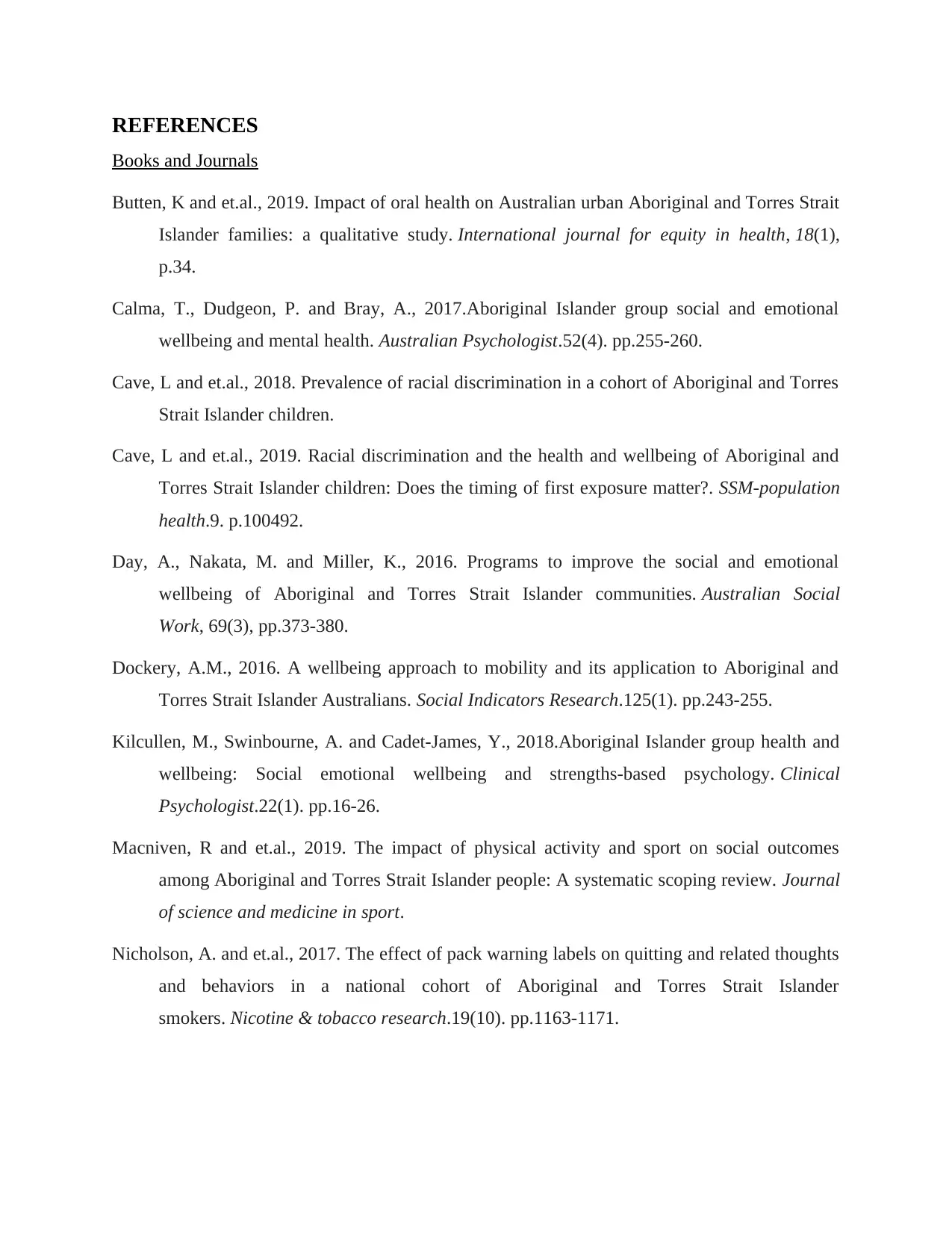
REFERENCES
Books and Journals
Butten, K and et.al., 2019. Impact of oral health on Australian urban Aboriginal and Torres Strait
Islander families: a qualitative study. International journal for equity in health, 18(1),
p.34.
Calma, T., Dudgeon, P. and Bray, A., 2017.Aboriginal Islander group social and emotional
wellbeing and mental health. Australian Psychologist.52(4). pp.255-260.
Cave, L and et.al., 2018. Prevalence of racial discrimination in a cohort of Aboriginal and Torres
Strait Islander children.
Cave, L and et.al., 2019. Racial discrimination and the health and wellbeing of Aboriginal and
Torres Strait Islander children: Does the timing of first exposure matter?. SSM-population
health.9. p.100492.
Day, A., Nakata, M. and Miller, K., 2016. Programs to improve the social and emotional
wellbeing of Aboriginal and Torres Strait Islander communities. Australian Social
Work, 69(3), pp.373-380.
Dockery, A.M., 2016. A wellbeing approach to mobility and its application to Aboriginal and
Torres Strait Islander Australians. Social Indicators Research.125(1). pp.243-255.
Kilcullen, M., Swinbourne, A. and Cadet‐James, Y., 2018.Aboriginal Islander group health and
wellbeing: Social emotional wellbeing and strengths‐based psychology. Clinical
Psychologist.22(1). pp.16-26.
Macniven, R and et.al., 2019. The impact of physical activity and sport on social outcomes
among Aboriginal and Torres Strait Islander people: A systematic scoping review. Journal
of science and medicine in sport.
Nicholson, A. and et.al., 2017. The effect of pack warning labels on quitting and related thoughts
and behaviors in a national cohort of Aboriginal and Torres Strait Islander
smokers. Nicotine & tobacco research.19(10). pp.1163-1171.
Books and Journals
Butten, K and et.al., 2019. Impact of oral health on Australian urban Aboriginal and Torres Strait
Islander families: a qualitative study. International journal for equity in health, 18(1),
p.34.
Calma, T., Dudgeon, P. and Bray, A., 2017.Aboriginal Islander group social and emotional
wellbeing and mental health. Australian Psychologist.52(4). pp.255-260.
Cave, L and et.al., 2018. Prevalence of racial discrimination in a cohort of Aboriginal and Torres
Strait Islander children.
Cave, L and et.al., 2019. Racial discrimination and the health and wellbeing of Aboriginal and
Torres Strait Islander children: Does the timing of first exposure matter?. SSM-population
health.9. p.100492.
Day, A., Nakata, M. and Miller, K., 2016. Programs to improve the social and emotional
wellbeing of Aboriginal and Torres Strait Islander communities. Australian Social
Work, 69(3), pp.373-380.
Dockery, A.M., 2016. A wellbeing approach to mobility and its application to Aboriginal and
Torres Strait Islander Australians. Social Indicators Research.125(1). pp.243-255.
Kilcullen, M., Swinbourne, A. and Cadet‐James, Y., 2018.Aboriginal Islander group health and
wellbeing: Social emotional wellbeing and strengths‐based psychology. Clinical
Psychologist.22(1). pp.16-26.
Macniven, R and et.al., 2019. The impact of physical activity and sport on social outcomes
among Aboriginal and Torres Strait Islander people: A systematic scoping review. Journal
of science and medicine in sport.
Nicholson, A. and et.al., 2017. The effect of pack warning labels on quitting and related thoughts
and behaviors in a national cohort of Aboriginal and Torres Strait Islander
smokers. Nicotine & tobacco research.19(10). pp.1163-1171.
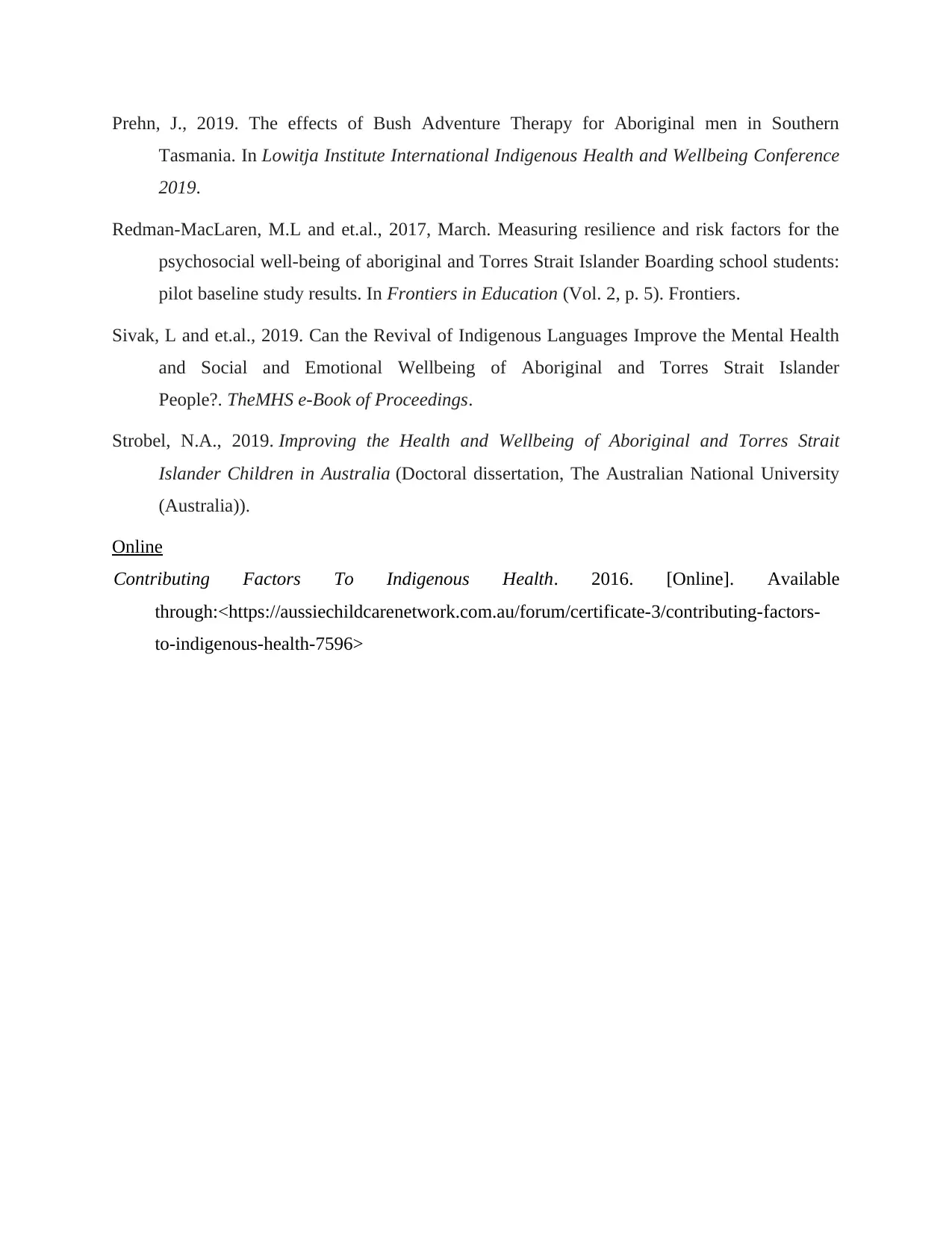
Prehn, J., 2019. The effects of Bush Adventure Therapy for Aboriginal men in Southern
Tasmania. In Lowitja Institute International Indigenous Health and Wellbeing Conference
2019.
Redman-MacLaren, M.L and et.al., 2017, March. Measuring resilience and risk factors for the
psychosocial well-being of aboriginal and Torres Strait Islander Boarding school students:
pilot baseline study results. In Frontiers in Education (Vol. 2, p. 5). Frontiers.
Sivak, L and et.al., 2019. Can the Revival of Indigenous Languages Improve the Mental Health
and Social and Emotional Wellbeing of Aboriginal and Torres Strait Islander
People?. TheMHS e-Book of Proceedings.
Strobel, N.A., 2019. Improving the Health and Wellbeing of Aboriginal and Torres Strait
Islander Children in Australia (Doctoral dissertation, The Australian National University
(Australia)).
Online
Contributing Factors To Indigenous Health. 2016. [Online]. Available
through:<https://aussiechildcarenetwork.com.au/forum/certificate-3/contributing-factors-
to-indigenous-health-7596>
Tasmania. In Lowitja Institute International Indigenous Health and Wellbeing Conference
2019.
Redman-MacLaren, M.L and et.al., 2017, March. Measuring resilience and risk factors for the
psychosocial well-being of aboriginal and Torres Strait Islander Boarding school students:
pilot baseline study results. In Frontiers in Education (Vol. 2, p. 5). Frontiers.
Sivak, L and et.al., 2019. Can the Revival of Indigenous Languages Improve the Mental Health
and Social and Emotional Wellbeing of Aboriginal and Torres Strait Islander
People?. TheMHS e-Book of Proceedings.
Strobel, N.A., 2019. Improving the Health and Wellbeing of Aboriginal and Torres Strait
Islander Children in Australia (Doctoral dissertation, The Australian National University
(Australia)).
Online
Contributing Factors To Indigenous Health. 2016. [Online]. Available
through:<https://aussiechildcarenetwork.com.au/forum/certificate-3/contributing-factors-
to-indigenous-health-7596>
⊘ This is a preview!⊘
Do you want full access?
Subscribe today to unlock all pages.

Trusted by 1+ million students worldwide
1 out of 9
Related Documents
Your All-in-One AI-Powered Toolkit for Academic Success.
+13062052269
info@desklib.com
Available 24*7 on WhatsApp / Email
![[object Object]](/_next/static/media/star-bottom.7253800d.svg)
Unlock your academic potential
Copyright © 2020–2026 A2Z Services. All Rights Reserved. Developed and managed by ZUCOL.





